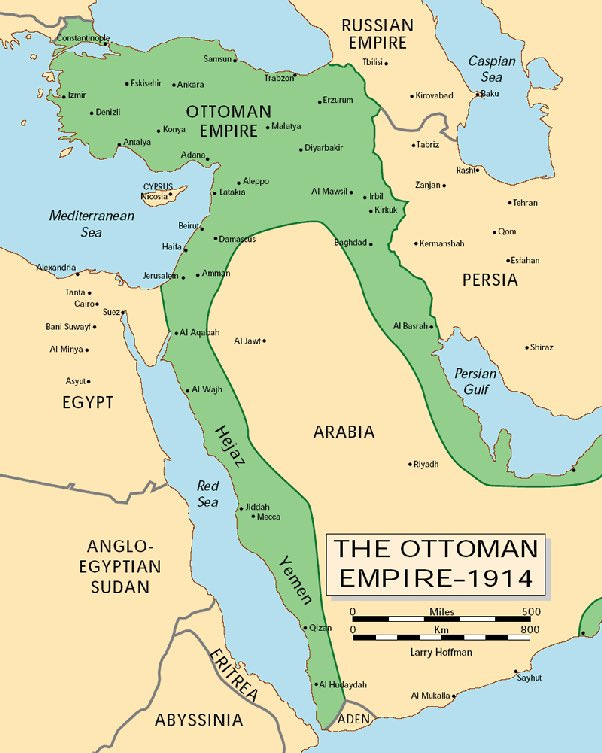Mikael Valtersson comes to the surface, after a long absence. I’ll post his map first, because it says so much. For Americans WW1 is ancient history. Not so for the Turks. The Arabs all remember, too:
Part 2 hasn’t appeared yet. If Part 2 appears …
Mikael Valtersson @MikaelValterss1
ANALYSIS: TÜRKIYE AND GEOPOLITICS, DEC 8, 2024
Part 1/2 Background
The fall of Assad and the capture of the majority of Syria by Turkish supported HTS and SNA is the biggest active geopolitical victory for Erdogan and Türkiye for much more than a century. Much has happened since the 1970s.
When I started to take an interest in Turkish geopolitics around 1980, as a teenager, I saw a situation where Türkiye slowly came out of a very precarious geopolitical situation in the 1970s. Then Türkiye was surrounded by many strong military powers and in dire need of US and NATO protection.
The biggest threat was of course the combined might of the Soviet Union and the Warzaw pact with military forces close to Istanbul in Bulgaria. Then we have Syria, Iraq and Iran, all with strong militaries. Iraq and Syria were also closely aligned with the Soviet union.
Iran under the Shah aimed at becoming the leading power in the Middle East. At the same time relations with the neighbouring NATO ally Greece was on the verge of war and Türkiye was also partially isolated internationally due to the invasion of Cyprus in 1974.
The chaos in Iran after the fall of the Shah in 1979 and the long and hard Iraqi-iranian war 1980-88 reduced the threat to Türkiye greatly. Then came the fall of the Warzaw pact in 1989 and the fall of the Soviet union in 1991. This changed everything.
Türkiye was now surrounded by smaller, independent and non hostile nations to the north west and northeast. At the same time Syria lost its backer and slowly began to decline.
It was a totally different geopolitical situation for Türkiye in the 1990s compared to the 1970s.
Now Türkiye is the strongest, not one of the weakest, country in the neighborhood. This was the country I did geopolitical research about in the 1990s. This development was in itself a geopolitical revolution for Türkiye, but then came a second geopolitical revolution when Türkiye evolved to a regional dominant power with large geopolitical aspirations.
This development wasn't clear during the beginning of the Erdogan rule in Türkiye. He became first Prime Minister of Türkiye in 2003 and then President in 2012, when the constitution was changed to strong presidential power. Erdogan is both a pragmatic islamist and a neo-Ottoman "nationalist".
Importantly, he’s a Muslim Bro. That’s absolutely crucial to understanding Erdogan—outside of the fact that he’s a Turk.
Türkiye was ruled by a secularist and pro Western political, bureaucratic and military elite, mostly in undemocratic form, from the early 1920s until the early 2000s. Their main enemies where islamist forces that threatened Kemål Atatürk's secular state, the communist external and internal threat and Kurdish separatism (PKK etc).
When Erdogan came to power the Kemalist secular deep state was very strong and could at any moment do another coup and prohibit the Islamist governing party. The main focus during Erdogans first decade in power was to survive and weaken the deep state.
During that period policy focused on economic development, good relations with the mostly more religious Kurds and closer relations with the EU. For a short period it even looked like Türkiye could become a member of the EU, but growing anti Islamic feelings in Europe and a realisation that Türkiye would in time become the most populous and influential member of the EU stopped such plans.
Disillusioned with European reluctance to accept Türkiye and with both a much better economy and self esteem, Erdogan's Türkiye decided to make it alone as a regional major power. This was made much easier by the elimination of the Kemalist deep state, especially after the wide ranging purges after the failed coup attempt against Erdogan in 2016.
Erdogan then got the support of the majority of the military by taking a strong stance against all Kurdish actors, building a large modern defence industry, wide ranging rearmament programs and giving the military a key role in a more offensive foreign policy.
With limited internal opposition and a strong external position Erdogan now went on the offensive.
Last edited
6:07 AM · Dec 8, 2024




Im passing this on for your information.
https://thefederalist.com/2024/12/10/assads-downfall-proves-neocons-have-learned-nothing-from-disastrous-middle-east-meddling/
I wonder what Erdo's plans are regarding the Kurds in Syria. If he goes after them openly, maybe to run them out of Syria and into Iraq, what will the US reaction be?